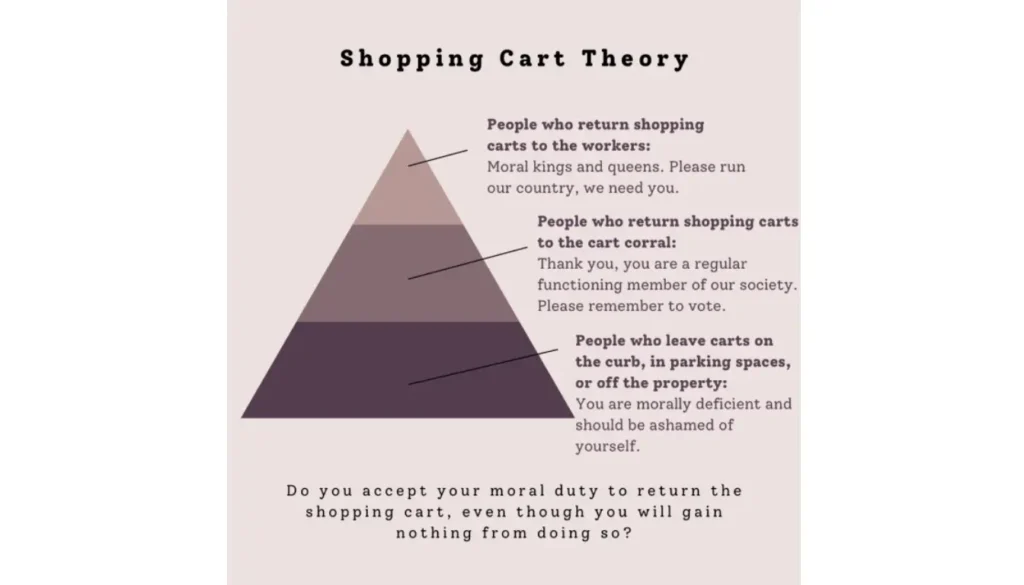Shopping Cart Theory: What It Reveals About Us!
Hello shopping lover! We know that you’re curious about the shopping cart theory and what it says about people’s actions. In this article, we’ll dive into the shopping cart theory meme, explain what the theory is, and discuss why some believe it’s not always accurate. You’ll see how this simple idea ties into bigger questions about behavior and responsibility. Stick with us, and by the end, you’ll understand how this theory goes beyond just returning carts. It’s about understanding ourselves and our choices. Keep reading to learn more!
Key Takeaways
- Shopping cart theory connects ethical behavior to personal responsibility.
- The meme sparked widespread debate about social norms and individual values.
- Understanding this theory reveals deeper insights into human decision-making.
Shopping Cart Theory Origin
The Shopping Cart Theory originated in internet discussions and memes around 2020. It gained popularity as a way to evaluate personal ethics.
The concept suggests that a person’s decision to return a shopping cart to its designated place reflects their ability to self-govern. It invites observers to think about moral responsibility in everyday actions.
The theory is linked to the early design of shopping carts themselves. Sylvan Goldman invented the shopping cart in 1937 to encourage more grocery purchases. This invention symbolized modern retail and consumer behavior.
People began sharing opinions on social media platforms. Various posts featured the shopping cart as a metaphor for the character. It became a viral topic, sparking debates about personal values and societal norms.
Notable discussions highlight how small actions can reveal much about an individual’s conscience. Returning a shopping cart is seen as a simple task that reveals larger traits such as discipline and consideration for others.
As the theory spread, it also invited skepticism. Some argue that not everyone can return a cart due to physical limitations, while others view it as a straightforward sign of morality. This ongoing conversation continues to evolve, influencing how many view their daily choices.
What Is Shopping Cart Theory
Shopping Cart Theory explores the ethics behind returning a shopping cart. It serves as a measure of a person’s moral character and self-governance. This theory has gained attention for its implications for understanding societal behaviors.

Connotations and Implications
The act of returning a shopping cart often reflects a person’s sense of responsibility. When someone chooses to return the cart, it shows they respect shared spaces and care about the community. Conversely, leaving a cart scattered can imply a lack of consideration for others.
This behavior can indicate deeper values.
Those who return carts may prioritize order and organization, while those who do not might disregard communal norms. This theory can also raise questions about accountability. People must decide whether to follow the rules when not being watched.
Societal and Psychological Perspectives
Shopping Cart Theory offers insight into societal behaviors and individual choices. It highlights how small actions can reveal a person’s character. The theory suggests that habits formed in simple tasks can reflect larger moral frameworks.
Psychologically, this choice taps into self-governance and impulse control. It challenges individuals to think about their responsibilities in everyday life. The decision to return a cart can indicate one’s willingness to contribute positively to society.
Ultimately, this theory connects moral behavior with daily choices. Understanding these subtle dynamics can promote greater social awareness and community cohesion.
Shopping Cart Theory Meme
The Shopping Cart Theory became popular as an internet meme. It suggests that a person’s choice to return a shopping cart reflects their ethics and social responsibility.
This concept originated from a post on 4chan in May 2020. It quickly caught on as people began sharing their thoughts and experiences. The theory is seen as a litmus test for self-governance and integrity.
Many memes associated with this theory ask questions like, “Would you return the cart if no one was watching?” These prompts spark discussions about personal habits and morals.
Some people argue that returning a cart is not just about personal ethics. They suggest various factors can influence this decision, including physical ability, store layout, and societal norms.
The Shopping Cart Theory has sparked debates on platforms like TikTok and Instagram. Users often share humorous or serious takes on the implications of returning shopping carts.
Overall, the meme encourages reflection on everyday choices and their impact on community well-being. It serves as a reminder of how small actions can signify larger values in society.
Shopping Cart Theory Debunked
The Shopping Cart Theory suggests that a person’s character is shown by whether they return their cart. Critics argue against this idea, pointing out various flaws in its reasoning and application. The theory may overlook important aspects of human behavior and societal structure.
Arguments Against the Theory
One major argument is that the theory relies on an oversimplified view of morality. Returning a shopping cart does not account for the complexities of a person’s life situation. Many individuals may face physical challenges or personal issues that prevent them from returning a cart.
Ableism is another concern. By assuming everyone can return a cart, the theory ignores those with disabilities or parents with young children. This creates a judgment based on a person’s ability rather than their true character.
Additionally, the theory fails to consider cultural differences. In some places, returning a shopping cart may not be the norm or practical. Thus, judging moral character based on a single action can be misleading and unfair.
These arguments highlight flaws in using the Shopping Cart Theory as a measure of moral character.
Social Responsibility and Ethics
The shopping cart theory highlights how individual actions reflect personal ethics and social responsibility. It serves as a simple test of character whether one returns a shopping cart can indicate their moral responsibilities toward others and society.
Moral Obligations of Individuals
Returning a shopping cart is more than just a minor task; it showcases an individual’s commitment to communal spaces. Those who choose to return their carts demonstrate an understanding of shared responsibility. This action prevents potential hazards in parking lots, keeping them safely organized.
Moreover, the decision not to return a cart can affect others. It illustrates a lack of consideration for the experiences of fellow shoppers. Ethics in everyday actions, such as shopping cart management, play an important role in cultivating a respectful and functional community.
The Theory’s Impact on Behavior
Shopping cart theory explores how small actions reflect broader moral character. It suggests that returning a shopping cart is a measure of individual responsibility and consideration for others. Observations and real-life cases provide insight into how this theory manifests in behavior.
Real-Life Cases and Observations
In many communities, people have noticed that individuals who return their shopping carts often show similar behaviors in other areas of life. For example, studies suggest that these individuals tend to be more civic-minded and engaged in their neighborhoods.
Conversely, those who leave carts abandoned may struggle with larger societal responsibilities. This has led some to question their sense of community and responsibility.
Public reactions to shopping cart behaviors can also be telling. Many people will openly criticize those who abandon carts, reflecting a collective expectation of accountability. The theory serves as a conversation starter about personal ethics and societal values, influencing behaviors both in retail spaces and beyond.
Psychology Behind Decisions
The choices people make often reflect deeper motivations, revealing much about their character. Understanding the psychology behind these decisions can help clarify why returning a shopping cart is seen as a moral test.
Intrinsic Vs. Extrinsic Motivation
Intrinsic motivation comes from within. Individuals may return a shopping cart because they find satisfaction in doing the right thing. This internal drive indicates a sense of responsibility and self-respect. For example, a person who enjoys helping others may feel good about returning a cart.
Extrinsic motivation, on the other hand, relies on external factors. A shopper might return a cart to avoid a fine or negative judgment from others. This motivation is influenced by societal expectations and the desire to fit in. In both cases, the act of returning a cart serves as a reflection of one’s values and social awareness.
Frequently Asked Questions
The shopping cart theory raises interesting questions about human behavior, self-control, and social norms. The following sections explore the psychology behind this behavior, its origins, challenges, and its importance in social psychology and online discussions.
What is the underlying psychology behind the shopping cart behavior?
The shopping cart behavior relates to self-regulation and responsibility. It reflects how individuals view social norms and their role in maintaining order within a community. Returning a cart can indicate a sense of duty towards shared spaces and respect for others.
How has the shopping cart theory been challenged or debunked?
Critics argue that the theory oversimplifies human behavior. Some believe it does not account for external factors, like physical limitations or cultural differences. Others suggest that morality is too complex to be judged solely by this one action.
Where did the shopping cart theory originate, and what does it entail?
The shopping cart theory gained popularity from an internet meme that posits returning a shopping cart as a litmus test for self-governance. Its origins can be traced to discussions on ethics and personal responsibility, especially in modern society.
What significance does the shopping cart theory hold in social psychology studies?
Researchers note that the shopping cart theory taps into larger themes of morality and community behavior. It serves as a practical example for examining how everyday actions reflect deeper values and ethical beliefs in social settings.
How has the shopping cart theory been discussed or interpreted within online communities?
Online discussions about the shopping cart theory often highlight personal anecdotes and diverse opinions. These conversations can showcase various interpretations of morality and how individuals perceive their responsibilities in social environments.
What are considered to be the implications or consequences of the shopping cart theory in everyday life?
The theory suggests that simple actions, like returning a shopping cart, can have broader implications for social behavior. It may encourage individuals to reflect on their choices and the impact those choices have on community well-being.
Conclusion
In conclusion, the shopping cart theory offers a simple way to think about personal responsibility and ethics. It suggests that returning a shopping cart shows good character, but critics say it’s too simple and doesn’t consider other reasons someone might not return a cart. Some have even debunked the theory, arguing that we can’t judge people based on this one action. The debates around the shopping cart theory remind us that human behavior and ethics are complex.
Thanks for reading our guide! Don’t forget to subscribe to our blog. We’ll meet again for another informative article.







